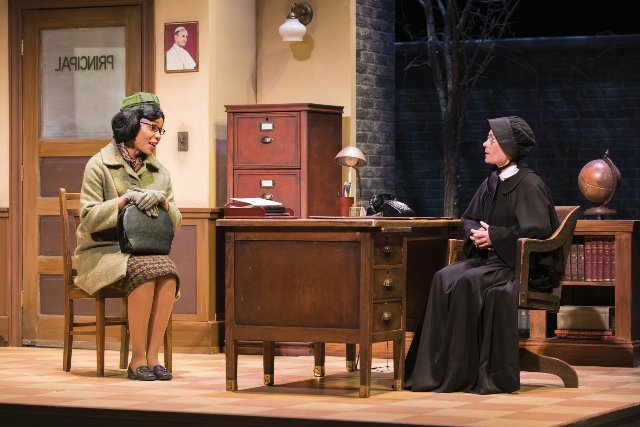
The two sisters meet with Father Flynn under false pretenses and ask him what happened in the rectory. Aloysius says Sr. James smelled alcohol on Donald’s breath. He eventually relents and admits that Donald was caught drinking sacramental wine, and that if others knew, Donald could no longer be an altar boy. The next Sunday, Flynn delivers a sermon on gossip. Sister James tells him about the undershirt, and that she saw him putting it in the locker, which he says he did so as not to embarrass Donald any further. Donald approaches Father Flynn, who avoids him. Immediately, Donald is bullied by a fellow student, because of Father Flynn’s avoidance. The toy breaks. Flynn sees this, and comforts Donald, hugging him.
Aloysius meets with Mrs. Miller, Donald’s mother, on Mrs. Miller’s way to work. She is surprised to learn that Sister Aloysius was once married, but her husband is dead. She is concerned about Donald’s graduation from Catholic school so he can attend a good high school where he will not be bullied. She tells Aloysius that Donald’s father beats him because of “his nature”, and that if his father knew, he would kill him. For that the reason he came to the school in the first place as she also feared for his life in public school. She says that Flynn was the only man that was ever good to Donald. She asks her to do what she will, but to leave her son out of it.
What is inconsistent about Sister Aloysius’ approach with deontology is that she believes, in this situation, that the ends justify the means, and even if they do not, she is so confident in her rightness, she is willing to be forced out of the church, and for her soul to be damned if it is necessary for the greater good, arguably because to question her judgment would mean questioning her entire identity/reality/rightness. Because of deontology’s presumptions of knowledge of this situation, determining what course of action is most consistent within its framework is difficult. One could say that a deontologist would gather more information, and then act based on the categorical imperative, but given Sister Aloysius’ isolation and specific place in society and the Church, that is arguably practically impossible, which is part of what drives her determination, in that she is powerless to affect change within the system, and is driven by desperation to act outside of it, as she then only herself will do the right thing.
Sister James will assist her, and only up to a point, which in and of itself is driven by her position over Sister James. The way in which Sister Aloysius treats Sister James, Mrs. Miller, and Donald is as a mere means manipulating them to serve her own ends, while denying their agency. This applies less to Donald, as a child who needs protecting, but by her manipulation which is arguably not out of pure duty, but simply a justification of her dislike of Father Flynn,given that she has been convinced of her knowledge of his wrongdoing, since he held another boy’s hand.
